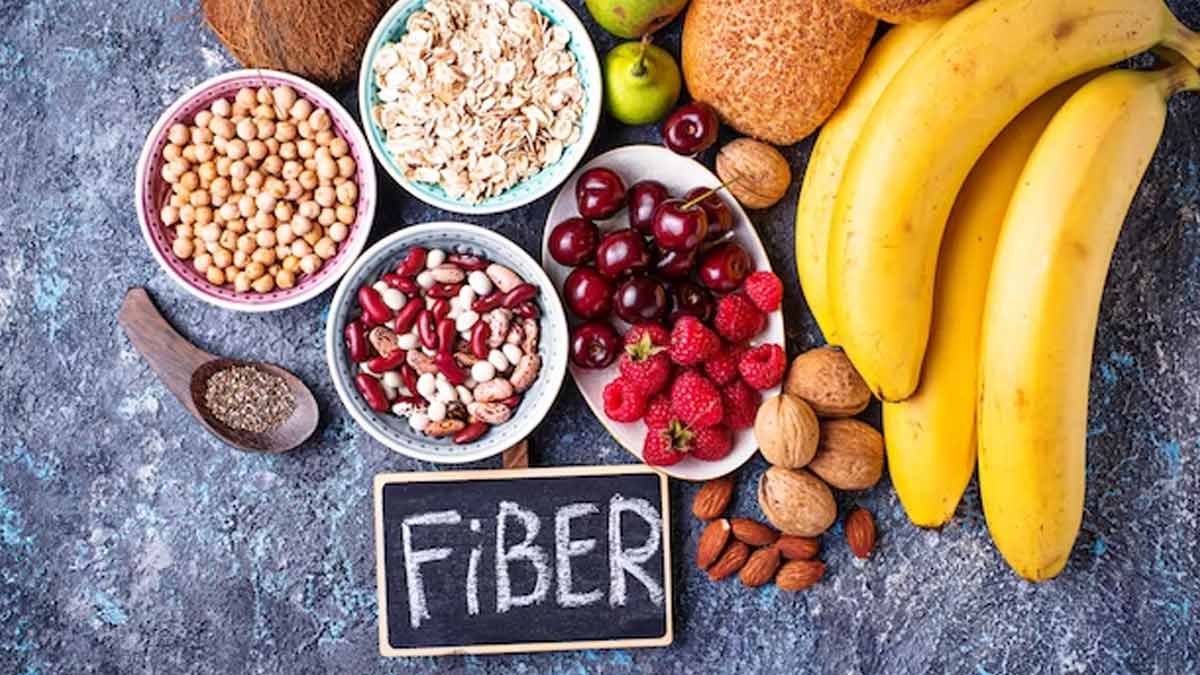
Fibre, also known as dietary fibre, is a type of carbohydrate found in plant-based foods that the human body is unable to fully digest or absorb. It passes through the digestive system, adding bulk to stool and aiding in regular bowel movements. While it has several health benefits, consuming an excessively-rich fibre diet can also lead to side effects. In an interaction with the OnlyMyHealth team, Prachi Jain, Chief Clinical Nutritionist and HOD-Nutrition and Dietetics, CK Birla Hospital, Gurugram, discusses the types of fibre and shares the recommended amount.
Types Of Fibre

There are two types of fibre:
Soluble fibre
It dissolves in water and helps in reducing the risk of alleviated cholesterols, strokes, Cardiovascular Diseases (CVDs), and type 2 diabetes. Jain shares that fibre is inversely proportional to cholesterol, meaning it can lower your blood cholesterol levels.
A study published in the American Journal of Clinical Nutrition found that soluble fibre was associated with small but significant decreases in total cholesterol.
Also Read: Signs Your Body Is Short On Fibre: Painful Haemorrhoids Is One Of Them
"The effect is small within the practical range of intake. For example, 3 g soluble fibre from oats (3 servings of oatmeal, 28 g each) can decrease total and LDL cholesterol by approximately 0.13 mmol/L. Increasing soluble fibre can make only a small contribution to dietary therapy to lower cholesterol," the research paper concluded.
Insoluble fibre
This type of fibre doesn’t get digested with the food present in one’s body, instead it passes through one’s Gastrointestinal (GI) tract and helps in adding bulk to stools, and thus one can experience improved bowel functions which further helps in preventing constipation.
To increase one’s dietary fibre intake, Jain recommends loading up on foods, such as whole cereals, whole pulses, fruits, salads, green seasonal vegetables, nuts and seeds.
Benefits Of Eating Fibre

Here are the benefits of consuming fibre:
- Helps in reducing the risk of heart diseases, stroke, hypertension
- Helps in improved bowel functions and thus prevents constipation
- Lowers the risk of developing type 2 diabetes
- Reduces the risk of GI disorders
- Improves lipid profile and blood cholesterols levels
- Helps in weight management as a high fibre diet makes you feel full sooner, preventing overeating and high calorie intake.
Also Read: High Blood Pressure Can Increase Your Risk Of Heart Attack: Best Ways To Bring It Down
Why You Shouldn’t Consume Too Much Fibre

While fibre is beneficial for health, consuming too much fibre can have some negative effects on the body. Here are some reasons why you should avoid excessive fibre intake:
- Digestive discomfort, such as bloating, gas, and abdominal cramps along with diarrhoea or constipation in some individuals
- Problems with the absorption of certain minerals and nutrients, such as calcium, iron, zinc, and magnesium, leading to nutritional deficiencies over time
- Irritation or damage to the lining of the gastrointestinal tract, especially in sensitive individuals or those with pre-existing digestive conditions
- A feeling of fullness that hinders overall food intake, potentially resulting in insufficient calorie consumption and nutritional imbalances
- May affect absorption and effectiveness of certain medications, reducing their efficacy
Fibre Recommendations
Requirement of fibre varies from men to women as they have different calorie requirements, says Jain, adding "Recommendations for dietary fibre of women is 25-30 gm per day, whereas for men, it is 35- 40 gm per day
Bottomline
When it comes to nutrition, one must learn to strike a balance between all important nutrients, which includes consuming a moderate amount of fibre based on individual needs and tolerance levels. If you have concerns about your fibre intake or experience any adverse effects, it's best to consult a healthcare professional or registered dietitian for personalised advice.
Also watch this video
How we keep this article up to date:
We work with experts and keep a close eye on the latest in health and wellness. Whenever there is a new research or helpful information, we update our articles with accurate and useful advice.
Current Version